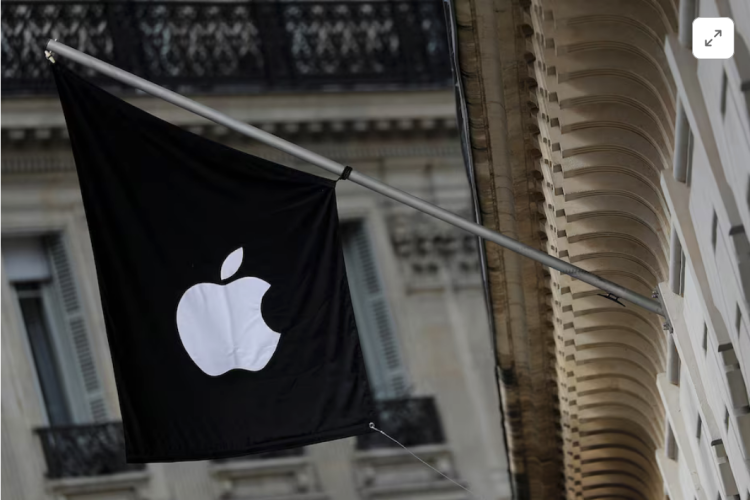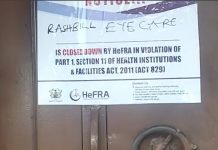The Democratic Republic of Congo (DRC) has filed criminal complaints against Apple subsidiaries in France and Belgium, accusing the global tech giant of complicity in using conflict minerals sourced from its troubled eastern regions.
The legal action, prepared by lawyers on behalf of Congo’s justice minister, marks a significant escalation in the country’s efforts to tackle illicit mineral exploitation fueling decades of conflict.
Congo is one of the world’s largest suppliers of tin, tantalum, tungsten (collectively known as 3T minerals), and cobalt essential components in the production of smartphones, computers, and other electronics.

However, many artisanal mines in eastern Congo are controlled by armed groups that fund their operations through illegal mineral exports, often engaging in widespread violence, including massacres, mass rapes, looting, and forced labor.
The legal complaints, filed in the Paris prosecutor’s office and a Belgian investigating magistrate’s office, target Apple France, Apple Retail France, and Apple Retail Belgium.
The charges include covering up war crimes, laundering of minerals tainted by conflict, handling stolen goods, and engaging in deceptive commercial practices by presenting their supply chain as ethically clean.
Apple, which does not directly source minerals from Congo, has repeatedly stated that it audits suppliers and works to ensure compliance with international standards. In its 2023 conflict minerals filing to the U.S.
Securities and Exchange Commission (SEC), Apple claimed that none of its smelters or refiners directly financed or benefited armed groups in Congo or its neighboring countries. It also emphasized its active participation in the Responsible Minerals Initiative (RMI), a global effort to improve mineral traceability.
However, Congo’s lawyers argue that Apple continues to rely on the International Tin Supply Chain Initiative (ITSCI)—a monitoring scheme discredited by multiple reports, including one by Global Witness titled “The ITSCI Laundromat.”
The report accuses ITSCI of enabling minerals from conflict zones to be falsely labeled as originating from peaceful areas. While RMI suspended ITSCI in 2022 for failing to address escalating violence and traceability issues, Apple reportedly continues to cite ITSCI in its compliance filings.
The DRC also highlights Belgium’s historical connection to Congo, citing moral responsibility due to its colonial past under King Leopold II, during which Congo’s resources were extensively looted.
Christophe Marchand, Congo’s Belgian lawyer, emphasized that Belgium has a duty to act, stating, “It is incumbent on Belgium to help Congo in its effort to use judicial means to end the pillaging.”
The complaints reflect growing frustration over the role of multinational corporations in sustaining conflicts in resource-rich regions. Since the 1990s, Congo’s eastern provinces have been torn apart by violence involving armed militias, foreign interventions, and the Congolese military.
Competition for valuable minerals continues to be a key driver of the unrest, with proceeds often smuggled through neighboring countries like Rwanda and Uganda, which have denied any involvement.
The legal action is seen as a bold step, representing the first criminal complaint by the Congolese state against a major tech corporation.
PiU.S.-based lawyer Robert Amsterdam, part of Congo’s legal team, described the filing as a “first salvo” in a broader campaign to hold corporations accountable for complicity in resource-driven conflicts.
France and Belgium were chosen as jurisdictions for the complaints due to their strong emphasis on corporate accountability. Judicial authorities in both countries will now determine whether to investigate the case further and potentially bring criminal charges against Apple and its subsidiaries.
This move comes against the backdrop of growing international scrutiny of supply chains, with companies facing mounting pressure to ensure their products are free from materials linked to human rights abuses and conflict.
In a related development earlier this year, a U.S. court dismissed a lawsuit seeking to hold Apple, Google, Tesla, Dell, and Microsoft liable for their alleged reliance on child labor in Congolese cobalt mines.
The outcome of these latest complaints could set a significant legal precedent, underscoring the role of multinational corporations in the ethical sourcing of critical raw materials and their broader responsibilities in addressing global human rights violations.























































![[FREE FREE MONEY] Predict and Win a Guaranteed GH¢200 From Us EVERY WEEK](https://wordpress.ghanatalksradio.com/wp-content/uploads/2022/02/Predict-and-Win-Final-09-03-2021-218x150.jpg)
![[Predict & Win – 8th/Oct.] WIN A Guaranteed ¢200 From Us This Week](https://wordpress.ghanatalksradio.com/wp-content/uploads/2021/10/maxresdefault-16-218x150.jpg)
![[Predict & Win – 2nd] WIN A Guaranteed ¢200 From Us This Week](https://wordpress.ghanatalksradio.com/wp-content/uploads/2021/09/maxresdefault-50-218x150.jpg)
![[Predict & Win – 25th] WIN A Guaranteed ¢200 From Us This Week](https://wordpress.ghanatalksradio.com/wp-content/uploads/2021/09/maxresdefault-36-218x150.jpg)
![[Predict & Win – 18th] WIN A Guaranteed ¢200 From Us This Week](https://wordpress.ghanatalksradio.com/wp-content/uploads/2021/09/maxresdefault-23-218x150.jpg)











![[National cathedral] See full list of churches that have contributed since 2018](https://wordpress.ghanatalksradio.com/wp-content/uploads/2020/09/Ghana-National-Cathedral-GhanaTalksRadio-100x70.jpg)



